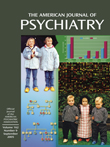To the Editor: An enduring issue in trauma-focused research studies is the need to minimize harm to research participants. A recent review
(1) suggests that psychiatric symptoms associated with trauma, such as posttraumatic stress disorder (PTSD), are not significantly exacerbated by participation in research that addresses exposure to traumatic events. Yet there remains concern that those who do not participate or who decline to answer questions about sexual trauma may differ on demographic variables or have more severe PTSD symptoms than those who do, affecting how we consider the cost-benefit ratio for the protection of human subjects in such research.
A cross-sectional epidemiological study was conducted on a random sample of veterans at four Veterans Affairs medical centers in the southeastern United States
(2). A total of 1,198 randomly identified veterans were approached for study participation, and 885 provided informed consent. Of 885 veterans, complete follow-up data were available for 733. From the sample of 733, 556 were given the option of not answering questions related to sexual assault on the Trauma Assessment for Adults
(3), and these veterans comprised our final sample.
First, comparisons on demographic characteristics (age, gender, race, education, work status, relationship status) and PTSD Checklist—Military
(4) scores were made between the final sample (N=556) and those who could not be reached for follow-up interviews (N=138). There was a higher rate of living with someone as opposed to living alone in the final sample (N=387 of 554, 69.9%) compared to the excluded sample (76 of 135, 56.3%) (χ
2=9.05, df=1, N=689, p<0.01), the completers were slightly older (mean=62.13 years, SD=11.70) than the noncompleters (mean=58.85 years, SD=13.20), and the completers had slightly lower PTSD Checklist—Military scores (mean=26.61, SD=13.89) than the noncompleters (mean=29.41, SD=14.76) (F=8.18, df=1, 687, p<0.01, and F=4.39, df=1, 689, p<0.05, respectively). Comparisons were then made between those who answered sexual trauma questions (N=508) and those who declined (N=48) on demographic variables and PTSD Checklist—Military severity scores. Only one significant difference emerged: those who declined were about 5 years younger (mean=56.58 years, SD=13.69) than those who answered such questions (mean=62.68, SD=11.36) (F=12.18, df=1, 552, p<0.01).
Unfortunately, our study did not permit comparisons to those who declined to provide informed consent. However, differences between the completers and those who were lost to follow-up were minimal (i.e., a 3-point difference in score on the PTSD Checklist—Military is not clinically meaningful). Furthermore, although the participants who decline to answer sexual trauma questions may have been slightly younger, they did not differ from those who were willing to answer such questions on significant demographic characteristics or PTSD symptom severity. These data further support the idea that the protection of human subjects’ cost-benefit ratio is acceptable in trauma research.

